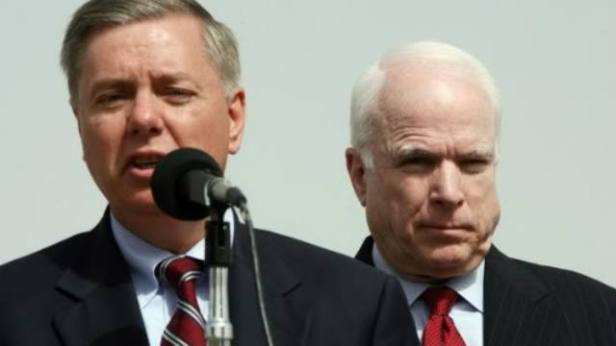Photo: Levi Gourdie’s Facebook
Videos by Rare
The Republican Party’s libertarian moment has arrived—and so has the backlash.
Rand Paul once again took the nation’s largest gathering of conservative activists by storm. Perhaps more surprisingly, so did marijuana legalization.
The younger generation of voters now coming of age is increasingly libertarian. Confidence in government is at a record low.
But not everyone is happy with these developments. The establishment—and the empire—is striking back.
New York Republican Rep. Peter King declared Rand Paul unfit to be a Tea Party leader and accused him of appealing to the “lowest common denominator.”
Whether this denominator is lower than the IRA was left unexplained.
Justin Amash, the leading libertarian Republican in the House, faces an establishment-backed primary challenger who says things like, “If something is unconstitutional, we have a court system that looks at that.”
You know, like the court system overturned patently unconstitutional laws like Obamacare.
The GOP establishment tried and failed to get the longtime president of the Northern Kentucky Chamber of Commerce to run against Paul-Amash Republican Rep. Thomas Massie in the primary.
Walter Jones isn’t exactly a libertarian. But the ten-term Republican congressman from North Carolina has aligned with them on foreign policy and civil liberties ever since he dramatically—and against his own political interest in a military-heavy district—turned against the Iraq war.
Jones faces a primary challenge from Taylor Griffin, a veteran of the Bush administration that brought the country into that disastrous $1 trillion war. Griffin is well connected, but Jones is undeterred.
“I am not a puppet, I’m not going to be a puppet,” the principled, independent-minded conservative insists.
The Weekly Standard’s Bill Kristol has alternately called GOP civil libertarians Code Pink Republicans and Snowden Republicans.
Even Ted Cruz, a frequent ally who won the endorsement of Rand and Ron Paul as well as Young Americans for Liberty in 2012, has been trying to create some distance on foreign policy.
This was always inevitable. Forces of change are ascendant within the GOP. But people happy with the Bush-McCain-Romney status quo were never going to give up without a fight.
Politics is also fluid and event-driven. Liberals like Rahm Emanuel never let a crisis go to waste. Neither do big government Republicans like John McCain or Lindsey Graham.
 Senators Lindsey Graham and John McCain
Senators Lindsey Graham and John McCain
Where Barack Obama’s NSA surveillance and proposed war in Syria cut against them, they can use Russia’s incursion into Ukraine or the negotiations with Iran to square their hawkishness with the Republican base’s instincts.
That’s why it’s incumbent upon libertarians and small government conservatives to make the case that it doesn’t strengthen America’s national defense when politicians make empty threats they don’t intend to back up.
Do the Republicans leading the anti-libertarian backlash want war? Or do they simply want to sound tough? They should be made to explain their positions.
The liberty movement needs to convince evangelicals and traditionalist Catholics that they will be as dogged guarantors of Christian conservatives’ religious freedoms as they are of Colorado’s retail pot stores freedom to sell marijuana.
Somebody needs to help Republicans live up to the ideals of the Tea Party—individual liberty, balanced budgets, sound money, free markets, limited government, and a healthy respect for the Constitution—and not just use them as election-winning campaign slogans.
If not the most libertarian generation, then who?
Talk is cheap, but unbalanced budgets, unreformed entitlement programs, unfunded wars of choice, and unbridled government growth are very expensive indeed.
The biggest part of the Republican Party belongs neither to the libertarian-leaners nor their critics. It instead consists of goodhearted men and women who love their country, dislike seeing Old Glory disrespected, and understand the value of hard work and taxpayer dollars.
“They don’t read Adam Smith or Edmund Burke,” said a conservative who spoke for an earlier generation of Republican insurgents, “but they came from the same schoolyards and playgrounds and towns as we did.”
Today they don’t read Ayn Rand, but they might vote for Rand Paul. They like Ted Cruz, but have an open mind on whether diplomacy trumps cruise missiles. They’ve followed leaders who have gone abroad in search of WMD and who have urged them to watch out for drones at home.
Their votes are up for grabs. They will not be the only people who decide whether this libertarian moment passes and the backlash prevails. But they will have a lot of say as to whether ideas translate into election victories and ultimately policy outcomes.
Can they be reached in time?


